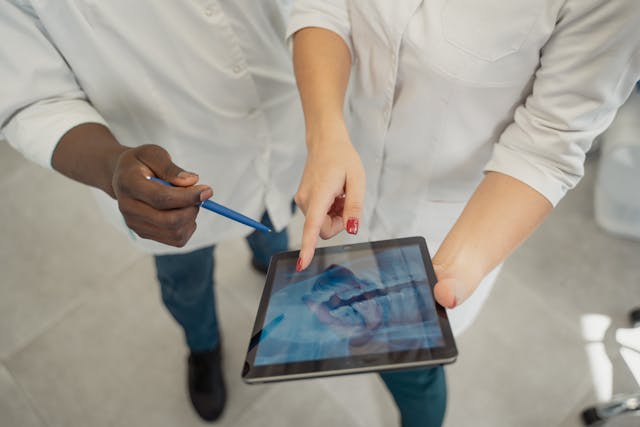Clinic Safety: How Technology is Changing Patient Care
Safety within the clinic has never been more crucial, and technology is transforming the way healthcare professionals protect patients' safety. From the protection of confidential patient data to new areas of telemedicine, healthcare IT innovations are transforming the industry.
Not long ago patient and healthcare management relied on paper charts and in-person visits. Now, as per the article from the Journal of Public Health Research, technology has reshaped how clinics operate, making processes smoother and more efficient. But when clinics don’t adapt, they can struggle with outdated systems, security risks, and even lose the trust of their patients.
Keeping Patient Data Safe with Smarter IT Systems
Data security, more so in Las Vegas, is one of the largest challenges for clinics today. Legacy security systems leave clinics vulnerable to cyber attacks, data breaches, and compliance violations. Trust is lost and clinics can also be subject to legal and financial penalties when patient data is compromised. Personal health information loss can lead to identity theft, fraud, and even medical errors if modified.
This is where clever IT solutions come into play. Improved encryption, safe logins, and regular staff training halt data leaks. Encryption renders patient information useless in the hands of unauthorized users, and safe login techniques such as multi-factor authentication add an additional layer of security. Regular staff training reduces human errors, the most frequent cause of security compromises.
A trusted Las Vegas managed IT service provider plays a key role in ensuring that the clinics have the most advanced and current security controls, reducing breach occurrences. The IT professionals operate networks, update as needed, and implement best practices that guard sensitive patient information.
Patients are increasingly discerning about where they get treated because of data security concerns. UpGuard says that big healthcare breaches have compromised millions of individual records, so cybersecurity is a priority for clinics. A breach harms a clinic's reputation and welcomes regulatory penalties, so active security is not a choice, it is a requirement.
Telemedicine and Remote Monitoring: Safer Care Beyond Clinic Walls
Telemedicine has also transformed patient management by providing easy and safe options as opposed to visits to the clinic. Video consultations enable physicians to diagnose and manage minor conditions at home, lessening the number of patient visits to the clinic. This limits exposure to sickness, especially where infectious conditions are the issue, and general safety in the clinic is increased.
Remote patient monitoring (RPM) is another technological advancement that is rendering health care even safer. Electronic devices such as intelligent blood pressure cuffs, glucometers, and wrist-based heart rate monitors allow doctors to track patients' health in real time. The technology can be used to its fullest extent in chronic disease management such as diabetes and hypertension, reduced hospital visits, and improved patient outcomes.
But patient safety of information in virtual healthcare settings is also important. Clinics must invest in video conferencing software that is encrypted, secure electronic health record (EHR) systems, and multi-factor authentication for patients to view their information. Managed services can help clinics install and update such security software so that telemedicine is safe. Without cybersecurity software, virtual care is an easy target for cyber hackers.
Cyber Threats in Clinics: What You Need to Watch For
Health clinics are one of the most coveted targets for cyber attackers. Cyber-attacked clinics can lead to patient data theft, disruption of systems, and even disruption of healthcare. Some of the typical threats include:
Phishing attacks
Legally structured emails trick employees into sharing sensitive information. The emails may contain embedded links directing them to impersonated login pages with the goal of capturing credentials.
Ransomware
Hackers' malware takes clinics hostage to their own machines until they pay the ransom. Ransomware can shut down operations and compromise patient safety by withholding life-saving medical procedures.
Insider threats
Staff members unintentionally or intentionally disclose private patient information. Unauthorized file access and misuse can lead to data breaches.
Man-in-the-middle attacks
Hackers intercept communication between patients and clinics with the possibility of stealing or interfering with sensitive information.
A Las Vegas technical provider can protect clinics from these types of threats by putting live threat detection, regular system patching, and employee cybersecurity awareness training in place. Proactive measures such as network segmentation, access controls, and incident response plans can significantly reduce the potential for cyberattacks.
Compliance and Regulations: Keeping Up with the Rules
Compliance with regulations is one of the largest issues for healthcare providers. The clinics must comply with strict data protection regulations such as HIPAA (Health Insurance Portability and Accountability Act) to maintain patient information private and secure. Failure to comply with HIPAA would lead to hefty fines and prosecution, so the clinics must be compliant.
Technical services are essential to maintaining compliance. They help clinics by:
- Performing regular security audits to identify potential vulnerabilities and keep security controls up to date.
- Installing HIPAA-compliant data storage software on the system, which keeps patient records secure and stores them in an archive.
- Training staff in secure handling of sensitive patient data, minimizing the risk of human error.
- Automated compliance reporting, which makes regulatory reports as easy and trouble-free as possible, and enables clinics to stay compliant with industry standards.
- Compliance helps to avoid clinics shelling out hefty fines, safeguard patient trust, and grant hassle-free healthcare.
What's Next? The Future of Clinic Safety and Technology
Clinic safety in the long term lies with breakthrough technologies like blockchain. Blockchain can provide tamperproof patient records, cut fraud and unwelcome visitors. Blockchain, as opposed to databases, ensures stored data cannot be edited without permission, making blockchain a good fit for shielding medical history.
Constant updates in technology will be the driving force to remain competitive with clinics. As attacks on security increase in complexity, so should security measures to match. Alignment with a Las Vegas provider ensures clinics benefit from expert consultation and proactive steps in securing patient data and clinic operations.

